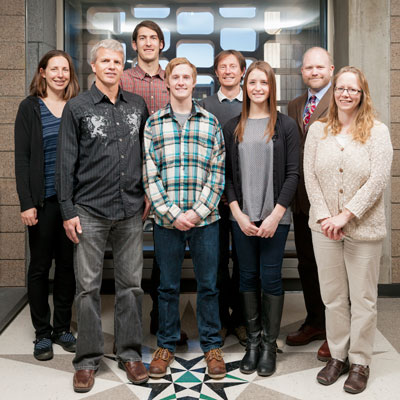CSB/SJU gain UN observer status
Delegation will attend convention on climate change in Paris in December
February 3, 2015
By Glenda Burgeson

An interdisciplinary group working to advance initiatives includes (back row, from left) Jessica O’Reilly, Alex Chocholousek, Troy Knight and Derek Larson; (front row, from left) Jeffrey Anderson, Daniel Phipps, Danielle DeBlieck and Sheila Hellermann.
The College of Saint Benedict and Saint John’s University have each been granted non-governmental observer status to the United Nations Framework Convention on Climate Change (UNFCCC).
A delegation of faculty and students from CSB and SJU will attend the convention in December in Paris.
UNFCCC is the international body through which delegates cooperate on addressing climate change and its impacts. Established in 1992, the organization meets annually to work on climate agreements.
Faculty organizers will celebrate this accomplishment and explain the application process to interested students and faculty at a reception at 5 p.m. Monday, Feb. 9, at the Great Hall. The event will include speakers, an informative session and a screening of a CSB/SJU student documentary filmed in 2009 at the UN Convention on Climate Change in Copenhagen.
The opportunity to observe deliberations on a global stage will have widespread benefits for the CSB/SJU community.
“It’s going to be awesome,” said Jessica O’Reilly, assistant professor of anthropology and lead author of the schools’ application.
“Our delegates will be able to observe UNFCCC diplomatic proceedings, contribute comments and bring ideas from the international arena back to our campuses.”
CSB and SJU are among a select few liberal arts schools to receive observer status, O’Reilly said. “It is a unique and prestigious designation, and we are very proud.”
The schools’ longstanding commitment both to global education and sustainability were key factors cited by the CSB/SJU authors in their application, O’Reilly said. With support from the Offices of the President from both campuses, the application spelled out how the liberal arts tradition could help generate expertise in climate issues among students across disciplines in areas of policy advocacy, scientific communication, education and political science.
The application also emphasized the interdisciplinary faculty expertise on climate change, and the interest among faculty in developing international environmental policy capacity and skills among students.
The observer status has given momentum to that goal. Throughout fall 2014, while awaiting word on the application, O’Reilly met with a group of faculty, administrators and students to strategize how best to advance studies in climate change.
They include Derek Larson, professor and chair of environmental studies; Troy Knight, assistant professor of environmental studies; Matt Lindstrom, professor of political science and director of the McCarthy Center for Public Policy and Civic Engagement; Jeffrey Anderson, associate professor of peace studies; Jean Lavigne, associate professor of environmental studies; Sheila Hellermann, department coordinator for political science, sociology and peace studies; Judy Purman, director of sustainability at CSB; SJU senior Daniel Phipps; and CSB first-year Danielle DeBlieck.
As a result, a new course on climate studies will be offered next fall and will be required for students selected as delegates. A climate studies track in the environmental studies minor is in place, and students are organizing a new student club, the Climate Action Club.
O’Reilly said faculty envision a strong research component with students presenting their work at conferences.
“Our students and faculty are involved in research and teaching about climate science and policy. This observer status will take us to a new level. With insights into international climate policy negotiations, our role as observers will allow us to conduct student-centered research and projects on international climate policy,” O’Reilly said.
